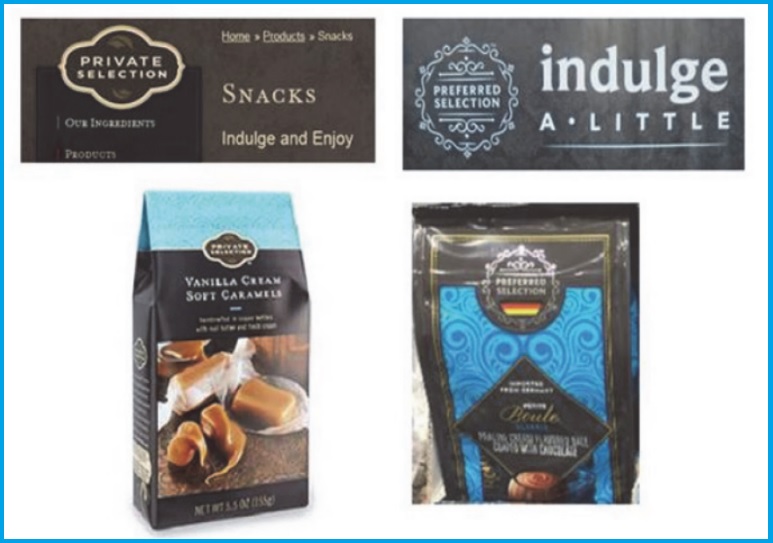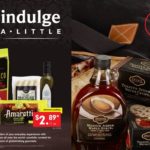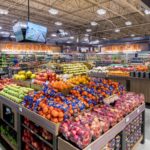
(Update: The judge has denied Kroger’s request for a preliminary injunction, so Lidl can continue to use its “Preferred Selection” brand for the time being. Pending any possible settlement agreement between Lidl and Kroger, a trial date has been set for January 11, 2018.)
A bit of friendly competition is getting decidedly unfriendly, as a trademark spat between the country’s largest grocery store and the country’s newest grocery store becomes downright unpleasant.
And the longer they battle it out in court, the more they spend – which could end up trickling down and affecting the prices you pay for some of the very products they’re fighting about.
A federal judge is due to consider today whether Lidl must immediately cease using the “Preferred Selection” name for its store-brand products. Kroger says the “Preferred Selection” name and logo (seen at right in the image above) are deliberate copies of its own “Private Selection” store brand (seen at left).
So Kroger sued the European grocer last month, two weeks after it opened its very first U.S. stores. Lidl has since responded to Kroger’s lawsuit, and Kroger has responded to Lidl’s response – creating an escalating war of words over everything from the intelligence of the average shopper, to which grocery store is best.
In its response, the upstart Lidl takes several swipes at its much larger competitor. “It is the threat of competition to Kroger that is behind this action,” Lidl claims. “While consumers may be happy about the increased selection and lower grocery bills that competition provides, Kroger is decidedly not. On the very same day as Lidl’s U.S. grand opening, Kroger announced to investors that its margins were down by half and that it had to lower its earnings guidance for the year.”
Ouch.
Lidl goes on to throw shade at Kroger’s “allegedly famous” Private Selection product line. “Kroger presented no evidence that its ‘Private Selection’ mark is a famous brand such that people across the country use ‘Private Selection’ as a household name like Coca-Cola, Nike, or Apple,” its response reads.
Ultimately, Lidl argues, Kroger is using the lawsuit to “disrupt the on-going launch of a new, emerging competitor that offers consumers high-quality products at far lower prices; distract from the positive reviews garnered by Lidl’s launch by painting Lidl as a copycat – when in fact Lidl is a decidedly different and (better) grocery experience; and drive up Lidl’s costs by having to defend against Kroger’s spurious claims.”
Kroger wasn’t about to let Lidl get the last word. It filed a response to Lidl’s filing, to address some of Lidl’s allegations.
Lidl’s response simply “ignores trademark law,” Kroger alleges. It accuses Lidl of attempting to obfuscate the issue “with the implausible charge that the 130 year-old Kroger brought this suit because it had a flat quarter (before Lidl opened).” Furthermore, Lidl “argues that PRIVATE SELECTION is not a famous, household name, but overlooks the fact the brand was purchased by 25 million U.S. households in 2016.”
In short, “Lidl’s PREFERRED SELECTION is not a garden variety trademark infringement,” Kroger claims. “Of all the marks in all the world… the mark it finally chose was the very one that is closest to Kroger’s 20+ year old house mark – PRIVATE SELECTION.”
Lidl says it conducted extensive testing and customer surveys before settling upon the “Preferred Selection” brand name. It did not intend to copy Kroger, it claims – and even if it had, Kroger’s “Private Selection” brand isn’t all that distinctive. “It is a merely descriptive, if not entirely generic, term for a grocery store’s ‘selection’ of ‘private’ label goods,” Lidl argues.
And Lidl says its customers are smart enough to know the difference. “There is no likelihood that a consumer will grab a jar of ‘Preferred Selection’ pasta sauce believing he or she is buying Kroger’s sauce. Consumers are well aware of the grocery store they are shopping in when they pull into the parking lot.”
Kroger says the alleged infringement works on a more subliminal level. “Shoppers are conditioned and comforted with Kroger’s reputation,” it asserts. So when they see “Preferred Selection” products at Lidl, they associate them with the hard-earned reputation of Kroger’s “Private Selection” products.
Lidl ends its argument with a more practical concern. Kroger is demanding that Lidl “deliver up for destruction” all packages and promotions that display the Preferred Selection logo, pay damages, and turn over to Kroger all profits from all sales of Preferred Selection products. Lidl says that would be both harmful and wasteful.
“An injunction here would require destruction or repackaging of a significant portion of Lidl’s grocery and packaging inventories,” causing a “waste of products that would otherwise go to feeding those in this community,” Lidl points out. Plus, “if consumers see that Lidl pulled the entirety of its high-end offerings from the shelves within weeks of launching its stores, many will lose trust in those products and/or assume something is wrong with the product itself.”
Ultimately, Lidl claims, “the harm that an injunction would cause Lidl far outweighs any hypothetical harm to Kroger.”
If the judge today doesn’t issue an immediate injunction, ordering Lidl to cease using the “Preferred Selection” name right away, the issue will proceed to trial.
In the meantime, as Lidl continues opening stores (it plans to have 100 in the U.S. within the next year, and hundreds more in the years to come) Kroger has now welcomed its new rival with a warning – that it won’t let Lidl steal its thunder without a fight.














